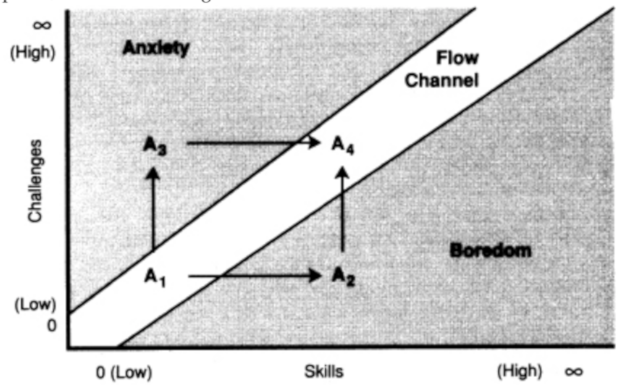Book notes - Flow The Psychology of Optimal Experience
Can optimal experience be defined in concrete terms ? Mihaly Csikszentmihalyi in his book Flow The Psychology of Optimal Experience tries to do just that.

Review
Optimal experience also called here flow is something we all experienced. It’s the moment when you experience euphoria, a deep sense of enjoyment that that eventually becomes a life lasting memory.
Such experiences that add up to a sense of mastery or a sense of participation in determining the content of life lead to happiness.
The book promises general principles along with concrete examples of how to experience more such moments.
About flow
The best moments occur when a person’s body or mind is stretched to limits in a voluntary effort to accomplish something difficult and worthwhile and are not necessarily pleasant at the time they occur. Optimal experience usually not the passive, receptive but something that we make happen.
Characterizing flow
Based on large scale experiments with participants from multiple countries with huge amounts of gathered data flow is described as:
A Challenging Activity That Requires Skills
A level of skill is required. The balance between skill and challenge has to be just right. Too high skill leads to boredom, too high challenge leads to anxiety, enjoyment appears at the boundary between the two, when the challenges are just balanced one’s capacity to act.
The Merging of Action and Awareness
Being completely absorbed by the activity to the point when the persons stop being aware of themselves as separate from the actions they are performing.
Clear Goals and Feedback
Feedback has to be logically related to the goal in which one invested energy. What makes feedback valuable is message it contains: that I have succeeded in my goal. Such knowledge creates order in consciousness, and strengthens the structure of the self.
Concentration on the Task at Hand
Being able to forget all the unpleasant aspects of life. This is an important by-product of the fact that enjoyable activities require a complete focusing of attention on the task at hand—thus leaving no room in the mind for irrelevant information.
The Paradox of Control
A feeling of control when risk is involved described as lack of worry about losing control that is typical in many situations of normal life.
The Loss of Self-Consciousness
Where there is not enough attention left over to allow a person to consider either the past or the future, or any other temporarily irrelevant stimuli. our own self disappears from awareness.
The Transformation of Time
Time no longer seems to pass the way it ordinarily does, often hours seem to pass by in minutes.
Fig: the conditions of flow:

Tips on improving one’s ability to experience flow
The ability to experience flow can be improved. The difference between someone who enjoys life and someone who is overwhelmed by it the way a person chooses to interpret events, whether he sees challenges as threats or as opportunities for action.
The autotelic self is one that easily translates potential threats into enjoyable challenges, and therefore maintains its inner harmony. A person who is never bored, seldom anxious, involved with what goes on, and in flow most of the time may be said to have an autotelic self.
Setting goals
To be able to experience flow, one must have clear goals to strive for. Setting goals is recognition of challenges, and suggest the skills necessary to overcome them. To develop skills one needs to pay attention to the outcome and monitor feedback.
Becoming immersed in the activity
To grow deeply involved in the activity while balancing opportunities for action with the skills possessed. Involvement is greatly facilitated by the ability to concentrate.
Paying attention to what is happening
Concentration leads to involvement, which can only be maintained by constant inputs of attention.
Learning to enjoy immediate experience
The outcome of having an autotelic self—of learning to set goals, to develop skills, to be sensitive to feedback, to know how to concentrate and get involved—is that one can enjoy life even when objective circumstances are brutish and nasty.
A special note on the body
When we are unhappy, depressed, or bored we have an easy remedy at hand: to use the body for all it is worth. Do physical exercise, use limbs and senses.
The Challenge of Lifelong Learning
Study should be a lifelong activity. It contributes to understanding the world around one, and developing a personal and meaningful sense of what one’s experience is all about.
Conclusion
I really liked this book. Many of its ideas were already familiar but it’s the first time I encounter them together in a format that can contribute to revelations about one’s purpose in life.
If I were to extract just one advice from this book that would be to fight entropy.
Read the book, it offers way more than reflected from my short summary.